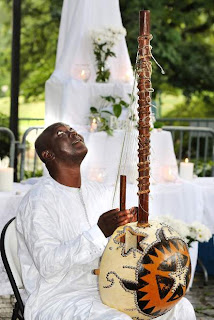 |
| Photo: Eliot Kamenitz |
Ceremony gives tribute to slaves
BY JIM DERRY
Special to The Advocate
July 07, 2013
0 COMMENTS
In 2001, a small group gathered to pay homage to their ancestors. On Saturday, for the 13th time, the annual gathering included hundreds of people at Congo Square — the same site where many slaves sang and prayed more than 200 years ago.
With a white altar sitting beneath oak trees, this year’s Maafa Commemoration opened with “Sunrise at Congo Square,” a three-hour tribute that included worship and celebration. Some arrived before 6 a.m. Saturday to the sound of drums and other music native to western Africa.
A procession followed on foot to St. Augustine Church, where those in attendance prayed at the Tomb of the Unknown Slave, and through the French Quarter, where slaves once were bought and sold. It then traveled to the Canal Street ferry for a sing-along and an offering of gifts to the ancestors.
“Maafa” is a Swahili word meaning great disaster or tragedy, and some represent it to mean African holocaust. Carol Bebelle, co-founder of the Ashé Cultural Arts Center and coordinator of Saturday’s event, said those who suffered “worked from ‘can’t see in the morning until can’t see at night.’ ” A representative of the Zion Trinity offered a song “for all those in the water who jumped ship or who were beaten or burned.”
“This is an opportunity to remind people of this history that is so painful in our country, and to also have people understand that part of being able to distance ourselves from it is to reckon with that past,” Bebelle said. “We need to continue to intentionally work to get as far away from that past as we can. This is a way to force us to reach farther for democracy.”
Others offered praise, in the form of both word and song. That included a dozen children from the Christian Unity Baptist Church in New Orleans, and Grayhawk Perkins, a New Orleans-born Native American Choctaw, who sang with the costumed Spirit of FiYiYi.
Before the congregation left Congo Square, seven white doves were individually released to symbolize and honor both ancestors and those living today. “We won’t bow down, and we will remember” was chanted each time a dove went soaring into the sky.
As it has in the past, the commemoration coincided with the weekend of Essence Festival, and as a result there were many people in the crowd both from the New Orleans area and across the country. In attendance, coincidentally, there was a representative of Congo — a theology professor who is in town spending the summer teaching at Xavier.
“In the Christian experience, it requires an awareness of your own identity and an awareness of your own culture,” said Modeste Malu Nyimi, who also teaches African studies at the Interdenominational Theological Center in Atlanta. “Here, this is like a lab where the African culture is at work elaborating itself. I couldn’t miss this opportunity.”
There was a wide range of those in attendance, as both the young and old prayed together. Many saw it as an opportunity not only to pay homage to their ancestors but to become more aware of just who they are.
“I’m new to all of this, but for me I always wondered if this sort of thing existed,” said someone who would identify himself only as Reginald from Memphis, Tenn. “This represents a wake-up call for me. This gives me a sense of heritage, it gives me a sense of purpose, and it gives me an avenue to understand myself better.
“This was like a homecoming for me.”